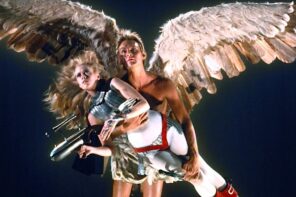Easter. It’s not much of a holiday compared to the Star Wars-franchise that is Christmas and the Avatar that is Halloween (now #2 in overall holiday spending). Easter, in cinematic terms, seems to me something out of Eric Rohmer: Frenchy, Catholic, seemingly full of fresh air and sunlight while remaining bittersweet and melancholy-tinged. Death is never far from the minds of Catholics, especially on this occasion. I would argue that Easter doesn’t get as far as a popular holiday because, jelly beans and chicks aside, it’s not an easy one. Easter contains the very essence of humanity: death, suffering and, just possibly, rebirth, in both its secular and religious applications.
Thought of mostly as a children’s holiday involving bunnies and egg hunts, Easter is actually the greatest holiday of the year. Why? It’s much less hyped than Halloween and “the Holidays.” It doesn’t really demand that you buy gifts for anyone or send cards—unless you want to. For people with small children, it’s a chance to enjoy a holiday which has remained strictly for children in its childish ways. There are no embarrassing costumes or horrifying office parties. Adults with no children may not even celebrate at all.
What does Easter even mean? Apparently the English term for the season has nothing to do with Jesus. It’s said to come from the name of a Germanic pagan goddess. It’s as if we were still calling Christmas “Yule.” Easter’s secular application—that is, officially marking the transition from winter to spring—doesn’t seem all that important any more; even less so in the age of encroaching climate change. Spring has become just a sort of polleny pause before summer, which is a more “real” season, somehow.
I, for one, am totally shocked by the appearance of hyacinths and cherry blossoms every year. I don’t imagine that flowers and trees are going to blossom again during the dregs of winter. Each year, I become convinced that I’m living in a dystopian Soviet future state where the weather is always tuned to the frequency of late January. When spring comes (as it always does), I’m thrilled again. Even if you’re not religious or don’t have children, Easter deserves a little bit of ritual. I have one nonbeliever friend who celebrates it by drinking red wine and watching The Life of Brian. Another makes Latvian Easter eggs to honor her forebears.
Easter is unique amongst the majors in being a movable feast, which might have something to do with its bottom-tier status in contemporary thought. We tend to like to know when, exactly, our holidays are going to be, but Easter falls after the first full moon after the spring equinox, which is full of all kinds of glamour and intrigue to me, but might be off-putting to serious Type-A personalities.
In The History of Time: A Very Short Introduction, Leofranc Holford-Stevens devotes an entire chapter to Easter and the struggle to find it and map it, which, he posits, was one of the major factors in shaping the modern calendar. Easter has fallen in significance, to put it mildly, which is another reason I think it’s tops. I tend to like underdogs and faded glory. I live in Baltimore.
Easter, for Catholics, is the most theologically significant celebration of the year. Easter, and its season, Lent, are about pain, sacrifice, and trying to correct one’s course before it’s (yikes) too late. I’m talking about death, of course—the great Catholic preoccupation. Not just death, but suffering, torture, abandonment. The great comedian Lenny Bruce nailed the oddness of Catholics’ cruci-fixation with his joke “If Jesus had been killed twenty years ago, Catholic school children would be wearing little electric chairs around their necks instead of crosses.”
I think we do so in order to keep our focus. Our brains want to think about anything but the inevitable, so some effort must be made to orient ourselves to the truth. It’s an odd quirk of human psychology that, even though we are aware that we will die, we do everything in our power to distract from this knowledge. But it’s a surety: we will all die. We will all suffer, at least emotionally, if not materially or physically.
I was surprised by how much I thought about the suffering of Jesus recently during one year of cancer treatment and an additional year as a cancer vaccine test subject. I didn’t actually understand what it meant to physically suffer before this point in my life, and, while I do not know what it feels like to be hung from a cross, I do understand physical distress which is so great it feels like one has been abandoned not only by everyone and everything you hold dear, but by life itself. By God.
Which brings me to the greatest reason why Easter is the true Queen of Holidays. Easter brings us a message of hope and joy in the face of the worst kind of suffering imaginable. Easter says that God hasn’t forsaken us, even when it feels like he absolutely has. Suffering will end, which is something I had to chant to myself when I was in such deep physical distress that I couldn’t move, couldn’t eat, couldn’t even talk, really. Having my eyes open or closed seem to make no difference. Seconds seemed not to touch each other—time crawled with vast, spiked-glass liminal spaces between them. But I made it through; it took a while, but Easter dawned for me as well.
On Easter morning, when it’s read that Jesus is not in his tomb, I’m surprised once more, just as I am when I see spring’s flowers. Jesus thought that God had abandoned him and cried out “My God, my God, why have you forsaken me?” But three days later, he walked again, just as the first tiny, translucent leaves appear as if by magic each year. Love always triumphs on Easter. Rebirth happens. Even if you’re not a Christian, the cycle of life on Earth will continue after you’re dead.
I saw a patch of tulips yesterday in my neighborhood, and I remembered plunking my then-baby daughter down in front of them and snapping some photos. She glared impressively in one and I made a card that said “Have a Crabby Day” on it and sent it to a friend, Carla, who was going through chemotherapy, which she really appreciated since all the other cards she got were way too cheerful. Carla is, of course, now dead, and my daughter is beginning to learn multiplication, but the tulips still bloom, regardless. What could be more important than this? Easter is a time to acknowledge that our time here is limited and that life will continue in some form or another after we are gone.
Lastly, on Easter, there are large quantities of chocolate and it’s quite all right to eat it in the morning, if you so desire. Because Lent is over, Hallelujah.




